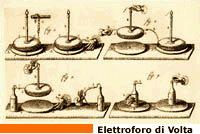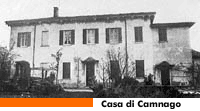 |
| Volta return |
| Deepening s |
| Documents |
| Chronology |
| Scientists index |
| Bibliography |
Alessandro Volta | |||
 Birth
certificate
Birth
certificate |
|||
Como
18.February.1745-Como
5.March.1827 | |||
| |
| ||
|
| Biography | | |
In
1763 he is student of the Jesuits, in the Benzi seminary, the Chierico
Giulio Cesar Gattoni invested large sums in order to favor the searches
and the study of the young person, already promised
genius. Time preferred to become self-taught as
soon as
yields account of its not common resources. In 1775 it invents
elettroforo (the elementary electrostatic generator from influence--
not for rubbing--) (1),
introducing it to Royal Society of London, and its
reputation becomes international. It becomes physical teacher in the
Athenaeum of Pavia in 1780. In 1784 it
comes
name chancellor of the Athenaeum Pavia, member of
the
Academy of the Entrusted ones of Pavia, Academic of sciences to Mantova
and member of Royal Society of
London. It was
striven in order to
modernize the university scientific search of its
time. In
1791 it is published from Galvani “De viribus electricitatis
in
motu musculari commentarius” where was introduced a theory on
the
animal electricity. Twenty March 1800 introduces to Joseph Banks,
secretary of the Royal Society l " organ artificial
electrical worker " or “electromotive apparatus” or
“apparatus to column”, is be a matter of the
Battery of
Time. This invention becomes a point of departure for all the history
of the electricity. The French scientists, follow us
of Galvani they name
this electromotive
apparatus with “battery of Galvani” producing
irritation
from Time, which succeeded to demonstrate the
originality
of own invention making to rename the apparatus battery of Time. Seven
November 1801
Time it read its
memory on the Electromotive ones to the presence of Napoleon, which
immediately proposed it a medal of gold for the Italian
scientist. Napoleon name it senator and the Austrians
successively name it “director of the philosophical
studies”. From
1819 the
student withdrew itself to private
life,
passing its time between Como and Camnago (Co)
where
possessed one villa of campaign. In the 1823 wife it communicates that
the scientist has saved itself from an infarct. In to a 1827 it forces
it fever to bed from which it would not be up, five March of the same
year dies to Como. | |||
 Alexander
Time was born to Como 18 February of 1745
from Filippo and Daisy De' Conti Inzaghi. The family Time belonged to
the Lombardi aristocracy and had much tightened ties with the
ecclesiastical atmosphere. After the dead women of the
father the
education of Alexander it is
entrusted to the uncle Alexander.
After to have attended - to 13 years - the school
of the Jesuits to
Como, it is transferred to the
Benzi seminary of Como, to the age
of sixteen
years.
Spaces are the attempts,
from father
Gerolamo Bonesi, master of Alexander, to start it on the
priesthood.
Equally useless the efforts of the uncle are revealed Alexander for
him undertaking the legal
studies.
The cultural interests of
Time are delineated clearly to eighteen years, when
- after to have
studied the works of Van Musschenbroek, of Nollet
and
Giambattista Beccaria
- it establishes an intense one
correspondence to epistolary with
the French scientist and its compatriot.
Around 1765 Volt to attends
the house of Giulio Cesar Gattoni
(1741-1809), where it has the
possibility to use of the physical cabinet that the Gattoni had
constructed between 1764 and 1765. The interest for
the electro logy
is stimulated from the searches of the friend
Gattoni thanks to
which, according to Giambattista Giovio,
Time “acquired great part
of its European name”. In the 1769 public Time the
dissertation “De Hindu electrici you attractiva
ignis ac phaenomenis pendentibus”, and
in the 1771 memory to epistolare “Novus
ac simplicissimus electricorum tentaminum apparatus”.
In 1774, behind interest of the Firmian, director) of the public
schools of Como is name resisting (; the successive
year, becomes
physical university professor experiences them in the gymnasium of Como. Alexander
Time was born to Como 18 February of 1745
from Filippo and Daisy De' Conti Inzaghi. The family Time belonged to
the Lombardi aristocracy and had much tightened ties with the
ecclesiastical atmosphere. After the dead women of the
father the
education of Alexander it is
entrusted to the uncle Alexander.
After to have attended - to 13 years - the school
of the Jesuits to
Como, it is transferred to the
Benzi seminary of Como, to the age
of sixteen
years.
Spaces are the attempts,
from father
Gerolamo Bonesi, master of Alexander, to start it on the
priesthood.
Equally useless the efforts of the uncle are revealed Alexander for
him undertaking the legal
studies.
The cultural interests of
Time are delineated clearly to eighteen years, when
- after to have
studied the works of Van Musschenbroek, of Nollet
and
Giambattista Beccaria
- it establishes an intense one
correspondence to epistolary with
the French scientist and its compatriot.
Around 1765 Volt to attends
the house of Giulio Cesar Gattoni
(1741-1809), where it has the
possibility to use of the physical cabinet that the Gattoni had
constructed between 1764 and 1765. The interest for
the electro logy
is stimulated from the searches of the friend
Gattoni thanks to
which, according to Giambattista Giovio,
Time “acquired great part
of its European name”. In the 1769 public Time the
dissertation “De Hindu electrici you attractiva
ignis ac phaenomenis pendentibus”, and
in the 1771 memory to epistolare “Novus
ac simplicissimus electricorum tentaminum apparatus”.
In 1774, behind interest of the Firmian, director) of the public
schools of Como is name resisting (; the successive
year, becomes
physical university professor experiences them in the gymnasium of Como. |
|||
With
the
support of Firmian and Kaunitz it undertakes, in
1777, its first scientific travel in
Switzerland,
Alsace and Savoia. During this travel it knows some between
more
celebrates naturalists, like H.B.De Saussure and J. Senebier. Behind
proposal of the general governor of the Hasburg
Lombardy
(many times over cited
Carl Giuseppe Conte of Firmian), it comes conferred to Time, in the
November of 1778, the Physical chair experiences them of the University
of Pavia. In
1771 the
Emperor Maria Teresa she had in
fact launched
one “Slowly of direction,
discipline and
economy of the University of Pavia " and, in 1773, a
“scientific Plan”. The performance of
such
programs it implied the
strengthening
of scientific instructions of the
athenaeum Pavia
who, in the intentions of the government of Vienna, had to become the
“school center them of the State”. Thanks to the
diplomatic
ability of conte the Firmian and to the collaboration of
Spallanzani, Boscovich and of the same
one
Time, the innovation of the scientific knowledge taken start in
Lombardy. In 1780, the scientist comasco
os to
Florence in order to visit the Regal Physical Museum and Natural
History and in order to lead naturalistic
surveyings. In
the September of 1781 he visits Switzerland, the Alsace, the
centroccidentale Germany, Holland, Belgium and,
towards the
December end, it reaches Paris. Stays for
four months
working here with Laplace and Lavoisier. In 1782 it reaches London,
where it is stopped until to June. Successively, in 1784, one
os,
with to the colleague Antonio Shoe, to Vienna and Berlin. The year
after will be name chancellor of the University of Pavia. The searches
completed, during years eighty, in electro logy,
meteorology electrical worker,
calorimetry,
geology and chemistry of the gas, they concur to
assert
itself like one of the most illustrious scientists than European level. |
|||
22
November 1794 spouse Peculiar Maria Teresa, from
which it
will have three sons: Zanino, Flaminio and Luigi; second, the Flaminio,
die to single eighteen years. After the publication of the written one
of Galvani “De
viribus electricitatis in motu musculari commentarius”
(1791), Time, than in 1794 had received
from the
Royal Society the Medal of Gold of Copley for its scientific
contributions, publishes on “Annals of
chemistry and
natural history” - review founded and directed from the
chemical
pavian Luigi Brugnatelli - a memory entitled “New memory on
the
electricity”, addressed to the Piedmontese physicist
Vassalli. Three years after it will give to the press three
tests
of character to epistolary,
addressed to the
German physicist Gren, from the title it "Sul galvanismo". |
|||
20
March
of 1800, Time communicates the president of the
Royal
Society, sir Joseph Banks, the invention of the
Battery. In
the June of the same year, Napoleon - to which Time
had
rendered homage in 1796 -
reaffirmation the
scientist comasco physical university professor experiences them near
the Athenaeum pavese. In the 1801 one os to Paris, accompanied from the
Brugnatelli, in order to illustrate the searches had lead that it to
the invention of the Battery. | |||
To
the
presence of Napoleon, first consul, reads the “Memory on the
identity of the fluid electrical worker with the galvanic
fluid”,
for which a gold medal will be assigned to it. In spite of the enormous
one happening, the modesty of the illustrious scientist comasco does
not come upsotten. To this end, pack-saddles to read this that Time
writes to the wife 7 November of 1801: “in the middle of many
things, that they must certainly makes it appeal to me, I
to sign not to believe me more than
those that
are; and to the life churned from a vain Gloria I prefer the
tranquility and sweetness of the domestic life” (Epistolario,
vol.IV, p.86). In the same year member is name of consults of Lion. |
|||
In
the
1805 Napoleon ago to assign a annual pension and ago to name Knight of
the Legion of Honor. In 1806 he becomes Knight of the Italian
Real Order of the Iron Crown; in 1809, senator of the Reign of Italy,
and at last, in 1810, conte of the Reign of Italy.
From
1801 to
1812 Time will cover
assignments publics: General Prime Minister of the department
of
the Lario; President of the Water Magistrate; reviser of the press and
member of the Office Centers them of the press freedom; Electoral Prime
Minister of the department of the Lario, from last. |
|||
Although the fall of the napoleonico regime and
the
consequent restoration
 Austrian,
the government of Vienna calls
it to Pavia with the assignment of director of the philosophical
studies of the athenaeum paves. In the 1819 Time he withdraws himself
to private life in its city born them. After a short disease, March
1827 to the age of 82 years will be extinguished in Como 5. Austrian,
the government of Vienna calls
it to Pavia with the assignment of director of the philosophical
studies of the athenaeum paves. In the 1819 Time he withdraws himself
to private life in its city born them. After a short disease, March
1827 to the age of 82 years will be extinguished in Como 5. | |||
| |